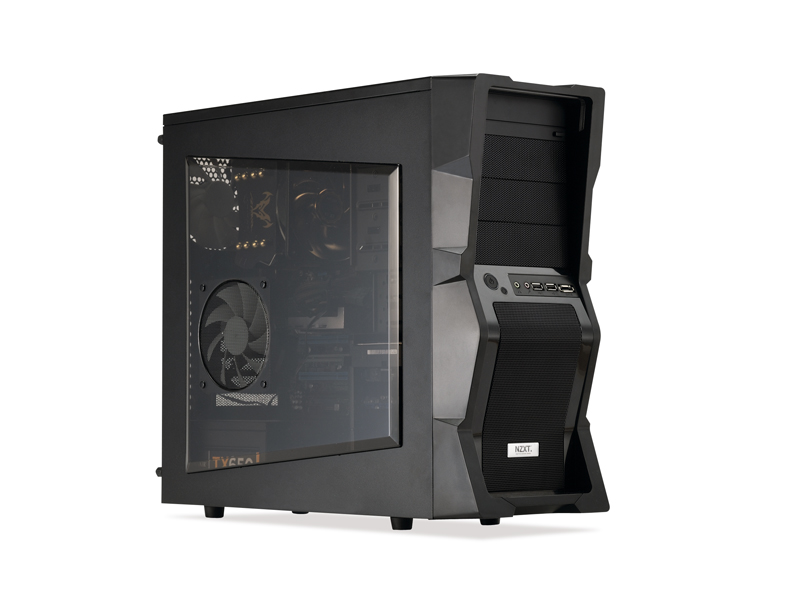TechRadar Verdict
Pros
- +
Overclocked CPU & quick RAM
- +
Smart GPU choice
- +
Great gaming performance
Cons
- -
No SSD or water cooler
Why you can trust TechRadar
So PC Specialist, what have we here with the Vortex M59 OC?
An overclocked Core i5 2500K? Why, a system with a CPU specification like that puts you in some pretty illustrious company: there's Chillblast's Fusion Rocket for starters.
Chillblast's overclocked 2500K runs at 4.5 GHz, which is 300MHz slower than this rig, but then it's also £150 cheaper. There's also our new favourite Core i5 system, the AT-FX Polaris. Inside that rig lies a 2500K overclocked to 4.8 GHz, matching PC Specialist's rig. It costs nearly £300 more, but there are several luxurious higher specified components inside to justify that.
The Vortex M59 OC fits neatly in between the two at £899. It's certainly a smart price point, but how does it compare to these two 2500K-equipped rivals? Would you be better off going for the cheaper or higher specified option, or does this rig offer a happy middle ground?
Well, let's look at the specs beyond that CPU. First, it's air cooled by a Titan Fenrir Evo. Approaching the £1,000 point, you might expect to see a water cooling unit, but PC Specialist has managed a big CPU overclock on air cooling, and that's fine by us; it is a good cooling unit after all. We've no grumbles so far.
Next, let's look at the memory. The Vortex has 4GB of Kingston HyperX 1,600MHz DDR3 RAM occupies this rig, and it performed very well in our memory bandwidth test, posting 20.76 GB/s, which is as quick as we've seen from a 4GB kit. That'll help any CPU-intensive tasks, such as video encoding, as well as loading times.
Chillblast's Fusion Rocket's 4GB kit doesn't have the throughput that these HyperX modules have, whereas up there in the Polaris's lofty heights, there's 8GB on offer. It still doesn't beat the Vortex's RAM in sheer GB/s, but having double the capacity is useful too. The RAM, like the CPU and cooler, do demonstrate a happy middle ground - so far so good.
This is a gaming rig, and gaming performance is all about graphics cards. Choosing the right card in a densely populated market is important to a system's overall value, and those crucial frames per second in your favourite games.
PC Specialist's solution: Nvidia's GTX 570. In a world of rigs powered by HD 6950s and GTX 580s, the GTX 570 is a rarity. They were quite expensive on launch, just shy of £300 for a Fermi card with largely the same layout as the GTX 480 but without that insatiable thirst for electricity. Just one stream processor away from the GTX 580, the 480 CUDA cores are still capable of high resolution, high frame rates, but a reduced 1.2GB of memory leaves it trailing way behind the GTX 580's impressive pace.
TechRadar Labs

DX11 tessellation performance
Heaven 2.5 Frames per second: Higher is better
Vortex M59 OC: 28
Fusion Rocket: 21.7
DX10 gaming performance
Just Cause 2 Frames per second: Higher is better
Vortex M59 OC: 60
Fusion Rocket: 40
CPU rendering performance
Cinebench R11.5 Index: Higher is better
Vortex M59 OC: 7.33
Fusion Rocket: 7.80
The price has been slashed since the GTX 570's release, making it a very appealing – you guessed it – middle ground between the 560 Ti and the full-blown 580. Sitting in this rig, it provides enough grunt to keep frame rates over 40fps at 1080p.
Our only reservation with the Vortex is the lack of an extra that the very best systems have. There's no SSD, the mobo is mid-range... not big problems, nor a rip-off at all, but the market is that tight.
Follow TechRadar Reviews on Twitter: http://twitter.com/techradarreview

Ad creative by day, wandering mystic of 90s gaming folklore by moonlight, freelance contributor Phil started writing about games during the late Byzantine Empire era. Since then he’s picked up bylines for The Guardian, Rolling Stone, IGN, USA Today, Eurogamer, PC Gamer, VG247, Edge, Gazetta Dello Sport, Computerbild, Rock Paper Shotgun, Official PlayStation Magazine, Official Xbox Magaine, CVG, Games Master, TrustedReviews, Green Man Gaming, and a few others but he doesn’t want to bore you with too many. Won a GMA once.
